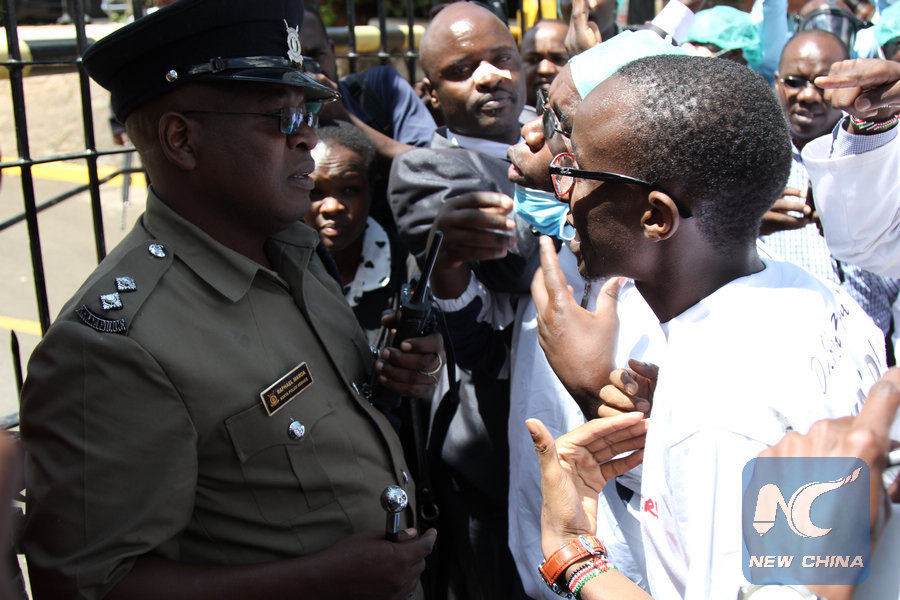
Photo shows ongoing national health workers strike in Kenya. (Xinhua)
NAIROBI, Dec. 7 (Xinhua) -- Hundreds of desperate patients, hit hard by an ongoing medical workers' strike in Kenya, have turned to ill-equipped private health facilities and self-medication.
The industrial action now in its third day has shut down East African nation's public health sector, causing agony and despair among patients as government struggles to find a solution to the crisis.
At least eight patients have died across the country following the strike that has paralyzed services at the public hospitals.
The doctors and nurses have gone on strike to push for better working conditions and a higher pay, accusing the government of neglect.
Doctors, through the Kenya Medical Practitioners, Pharmacists and Dentists' Union (KMPPDU), accuse the government of stalling the implementation of a 2013 collective bargaining agreement.
"If no money is offered to us, we will be on strike until our demands are met. We will not stop until doctors are accorded the dignity they deserve. Kenyans are entitled to quality and adequately paid doctors," said KMPPDU Secretary-General Fredrick Ouma Oluga on Tuesday.
Nurses, similarly through their union, are pushing for higher perks, citing neglect by the government in dealing with their grievances.
The government, on the other hand, has accused the health workers of insincerity, adding that they cannot meet their demands since they are not supported by the salary commission.
However, Health Cabinet Secretary Dr. Cleopa Mailu, who is holding talks on Tuesday with the union representatives in Nairobi, said that there is still room for negotiations as the government is committed to having industrial harmony.
"We shall continue to extend the goodwill of negotiations until this process is concluded and we hope to meet the doctors today to strike a balance. Strikes should be the last resort because the tools are there for us to be able to negotiate," Mailu said.
The KMPDU wants a 300 percent salary increment for its members while the Kenya National Union of Nurses wants a 25 to 45 percent increase.
Mailu however observed that any conclusion should take into consideration the input of the Salary and Remuneration Commission (SRC), a government body tasked with fixing salary for public servants, as well as the job evaluation exercise.
The standoff has pushed thousands of low-income patients to the edge, and with no cash to visit high cost private facilities; distressed families have flocked to ill-equipped clinics found in residential areas.
Inquiries showed the health facilities, some manned by quacks, are struggling to cope with increased number of patients.
"We came here early morning but we have not been attended to because the queue is long," said John Ochieng, who had taken a patient suffering from painful joints at a small health facility in Kayole on the east of Nairobi.
According to Ochieng, he had taken the patient, who had traveled from western Kenya to Mama Lucy Hospital, a government health facility in the area, on Monday but was unlucky to find medics were on strike.
"The pain has worsened and she cannot travel back," said Ochieng, noting that he had offered the patient a handful of painkillers in vain.
Pregnant mother Susan Museu missed her monthly ante-natal clinic Monday due to the strike, and since her supplements were over, she bought some over the counter from a chemist, not wanting to miss taking the drugs.
At least eight patients are reported to have died in different parts of the country on the first day of the strike Monday. And with the stalemate expected to last several weeks as the parties maintain hard-line stances, gloom has engulfed several families with patients.

